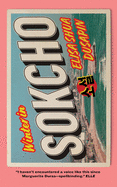
A quiet, severe winter in the Korean coastal town of Sokcho warms unexpectedly with the arrival of a foreigner in Elisa Shua Dusapin's prize-winning first novel, Winter in Sokcho, translated from the French by Aneesa Abbas Higgins. The unnamed young woman narrator is working the desk at a guesthouse in the off-season when Yan Kerrand, a creatively blocked comics author from France, checks in to work on the final installment of his series about a peripatetic archeologist. Pressured to fit an unfulfilling ideal of femininity, the narrator's ambivalent season of life dovetails beautifully with Kerrand's restlessness.
But this short, exquisite novel is not easily defined by a simple artist-muse relationship. The pair forge a mutually searching dynamic through intimate walks in the cold and daytrips to nearby points of interest, like the DMZ. The daughter of a Korean mother and an estranged French father, the narrator takes interest in Kerrand's country of origin, a place she has never seen but is connected to by blood and dreams. Meanwhile, she challenges his simplified impressions of her country: "Our beaches are still waiting for the end of a war that's been going on for so long people have stopped believing it's real.... We're living in limbo. In a winter that never ends."
There is a terseness to Winter in Sokcho, precipitating from the narrator's irritations with her vapid boyfriend, who aspires to be a model, and her aging mother's continual criticisms. But the brevity and pacing of its vignettes are also reminiscent of comics, Kerrand's books having "no dialogue, very few words." Conversely, Dusapin's beguiling work resembles a vibrant graphic novel, sans pictures. --Dave Wheeler, associate editor, Shelf Awareness

